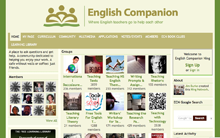 As literacy educators return to their classrooms, some may look to online spaces for fresh ideas. Recent posts on this blog have suggested following Twitter hashtags or provided numerous sites for online professional development. Similarly recognizing that social networking tools can be a great source of learning for teachers, we offer this review of the English Companion Ning (ECN), an online community “where English teachers go to help each other.” ECN, first mentioned on this TILE-SIG blog post by William Yang, has become a valuable resource in our own work with university English language instructors in Pakistan (for Khan) and pre-service secondary English teachers in the U.S. (for Lammers).
As literacy educators return to their classrooms, some may look to online spaces for fresh ideas. Recent posts on this blog have suggested following Twitter hashtags or provided numerous sites for online professional development. Similarly recognizing that social networking tools can be a great source of learning for teachers, we offer this review of the English Companion Ning (ECN), an online community “where English teachers go to help each other.” ECN, first mentioned on this TILE-SIG blog post by William Yang, has become a valuable resource in our own work with university English language instructors in Pakistan (for Khan) and pre-service secondary English teachers in the U.S. (for Lammers).
With more than 42,000 members discussing all aspects of the English curriculum and contributing to numerous forums that offer collegial support, ECN is “a community dedicated to helping you enjoy your work.” Jim Burke, a high school English teacher in California, speaker and author of more than 20 books, created ECN in December 2008 to support novice and experienced teachers in developing their professional skills. In 2009, ECN won the Edublog award for “Best Educational Use of a Social Networking Service.”
ECN encourages English teachers to seek help from members in a friendly and informal way. Described as “a cafe without walls or coffee: just friends” (see the ECN homepage image), ECN is a free resource for connecting and sharing. After creating an account on ECN, teachers can chat, blog, upload images and videos, participate in existing forums, create their own discussion groups, join the ECN book club, and share lesson plans, activities, links, and other teaching-related resources. ECN offers online professional development from anywhere, anytime.
Being a new teacher can be overwhelming for even the best prepared in our profession. While beginning teachers may be hesitant to ask questions or request feedback from within their school building, ECN can help novices specifically due to the supportive nature of interactions between experienced and new teachers. For instance, one ECN member, a new teacher, posted that she needed help teaching Shakespeare’s Julius Caesar. Her question yielded a variety of lesson ideas from experienced teachers who previously taught this text. Some members shared links for engaging activities regarding Julius Caesar, while others pointed her to existing threads on ECN about teaching Shakespeare, because their great ideas for teaching Julius Caesar came directly from this site. Similarly, when asked to teach a new course or text, even experienced teachers can seek mentorship by tapping into ECN’s vast network of teachers willing to help and share ideas.
The helpful and cooperative environment of ECN develops a sense of social connection and belongingness among community members. Teachers need not feel isolated in their classrooms, they can reach out on ECN to receive almost immediate support from others. In one of many such examples on the site, one ECN member posted she was stuck in the midst of a project with her class and asked for suggestions for completing it soon. She got seven replies to her post that very day, each with different ideas. ECN members took interest in her project and provided constructive feedback. In return, she shared the revised project plan she completed with the help of ECN members. As members ask and answer questions, ECN fosters a sense of connection and collaboration.
ECN’s members teach in classrooms around the world. The global nature of ECN connects members to a network of international colleagues, which is particularly helpful for English teachers in remote locations without access to professional development by other means. In addition to providing curriculum ideas, ECN serves as a source for career guidance. For instance, an English teacher in Iraq received assistance from a U.S. teacher in developing his research proposal for admission to a U.S. university. ECN is an international English department, connecting peers all over the globe.
ECN discussions are participant-driven and focus on what teachers want and need. When they get tasked with teaching something new, run into challenges in the classroom, feel lonely or isolated, or want to share successful lesson plans and strategies with others in the field, ECN can be a rich online resource for teachers.
Asma Khan is a doctoral student at the University of Rochester. She studies English as a Foreign Language teachers’ use of online spaces and can be reached at asma.yousafzai@gmail.com. Jayne C. Lammers is an assistant professor and director of the secondary English teacher preparation program at the University of Rochester. She studies adolescents’ literacy learning and can be reached at jlammers@warner.rochester.edu or on Twitter at @URocProf.
This article is part of a series from the International Reading Association’s Technology in Literacy Education Special Interest Group (TILE-SIG).